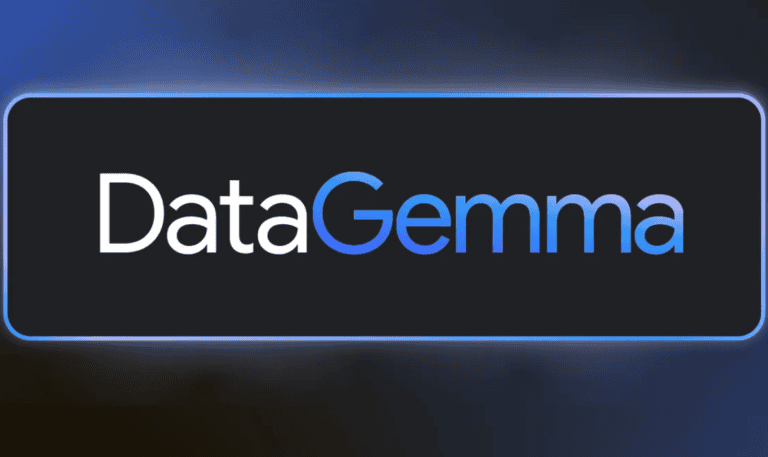GenAI models don’t always stay truthful without stringent checks. DataGemma is Google’s attempt to let AI scoop up information from statistical data, ensuring it sticks to the facts. Whether data scientists should look for another job now is doubtful. But the potential is enormous. Will some applications become obsolete now that Google is making it a lot easier to extract data insights?
In recent months, the refinement of GenAI has been a main theme. For example, Retrieval-Augmented Generation (RAG) allows an LLM to be provided with additional resources beyond the training data. For example, AI models have the ability to generate answers based on recent quarterly figures or reports.
With DataGemma, Google goes a step further. Retrieval-Interleaved Generation (RIG) kicks in immediately after a user input. The AI model looks up relevant data within Data Commons, an open data aggregator founded by Google itself. This form of factchecking is not unique, the company knows, but the “specific application within the DataGemma framework” is.
Research phase
For now, Google is in the research phase with DataGemma. For example, the training set for fine-tuning is still somewhat small, and the Data Commons facts are anything but ideal for NLP (Natural Language Processing). There is also no go-to-market strategy yet, and the handling of statistical information in the larger Gemini models is still unknown.
All this said, the promise is great. In addition, while Google states that it is still in the early stages with DataGemma, the competition is fierce. The initially half-baked Google Bard (later Gemini Advanced) was quickly thrown out the release door when it became apparent how big the ChatGPT hype had become in late 2022/early 2023. Later, Google launched a premature AI search feature called AI Overviews with utterly hallucinatory information in what was patently a desperate attempt to cut off search engines like Perplexity.
In short: if Google itself doesn’t come up with an evolutionary product building off of DataGemma, OpenAI, Anthropic, Mistral and/or Meta will. What would that mean?
AI in every application?
Much is said about GenAI, but quite often, it’s the same old story. IT solutions are now littered with AI offerings that summarize text, provide insights from data and automate processes. Even within a single vendor, like ServiceNow recently, adding “hundreds” of AI features is mostly an introduction of the same functionality across different specific use cases each time.
The core issue: AI takes place within a particular platform. Each software vendor hopes to appropriate it: SAP data for SAP AI, Einstein tools for Salesforce, et cetera. Hyperscalers are also participating in this game, trying to become the playground for AI development with Google Vertex AI, Azure AI Studio or Amazon Bedrock. In other words: GenAI takes place within a shell and can be accessed anywhere. However, that doesn’t so much shake up the IT landscape; it’s just one more factor to consider when picking IT vendors.
That may change significantly over time. Vendors are adopting the utility of nearby IT solutions, widening the usefulness of their applications and bumping up against what were once clearly defined barriers. This is not new since the AI emergence, but it is gaining momentum.
Is AI making other applications obsolete?
This fact has already driven some parties to radical choices. While laying off employees “at the hands of AI” often seems like an excuse, reducing the SaaS portfolio is different. CEO of buy-now-pay-later platform Klarna Sebastian Siematkowski recently said his company was Workday and Salesforce. This was because in-house AI was already said to be getting the job done, thus supposedly making insights from these applications redundant.
Salesforce CEO Marc Benioff has his doubts about that. After all, how does Klarna separate employee and customer data? “How does [Siematkowski] achieve compliance, governance of his company? What is his institutional memory?” These are legitimate questions that Klarna would really only have an answer for if it has in fact built its own applications for such uses. After all, Salesforce’s CRM platform and Workday’s HR technology are more than just the insights they provide. According to Benioff, Klarna’s choice betrays a fundamental misunderstanding of the possibilities of AI. Just as AI is not replacing jobs, according to Benioff, it is also not going to make entire services like his obsolete.
There is certainly something to that. With a further development of DataGemma, it will theoretically be possible to accurately retrieve and query all customer, personal and other statistical data. Arranging them somewhat meaningfully and continuing to work with them in a user-friendly way still requires the platforms we know and use. Completely replacing solutions like Salesforce and Workday is currently unrealistic and will remain so for some time. Rather, smaller parties that focus on automation, for example, should fear for their survival. After all, it is AI agents, which are already being launched without the statistical precision of DataGemma, that are squeezing out other parties. This fact shows that it is the established SaaS services that are more likely to benefit from AI in the long run, rather than really having anything to fear from it.
This is once again evident now that we have heard Benioff’s statements during Dreamforce. Instead, he sees Salesforce as the AI platform for businesses, while others would be better off stopping any further attempts to build their own AI.
Also read: Marc Benioff is on fire, never before has the Salesforce CEO been so outspoken
